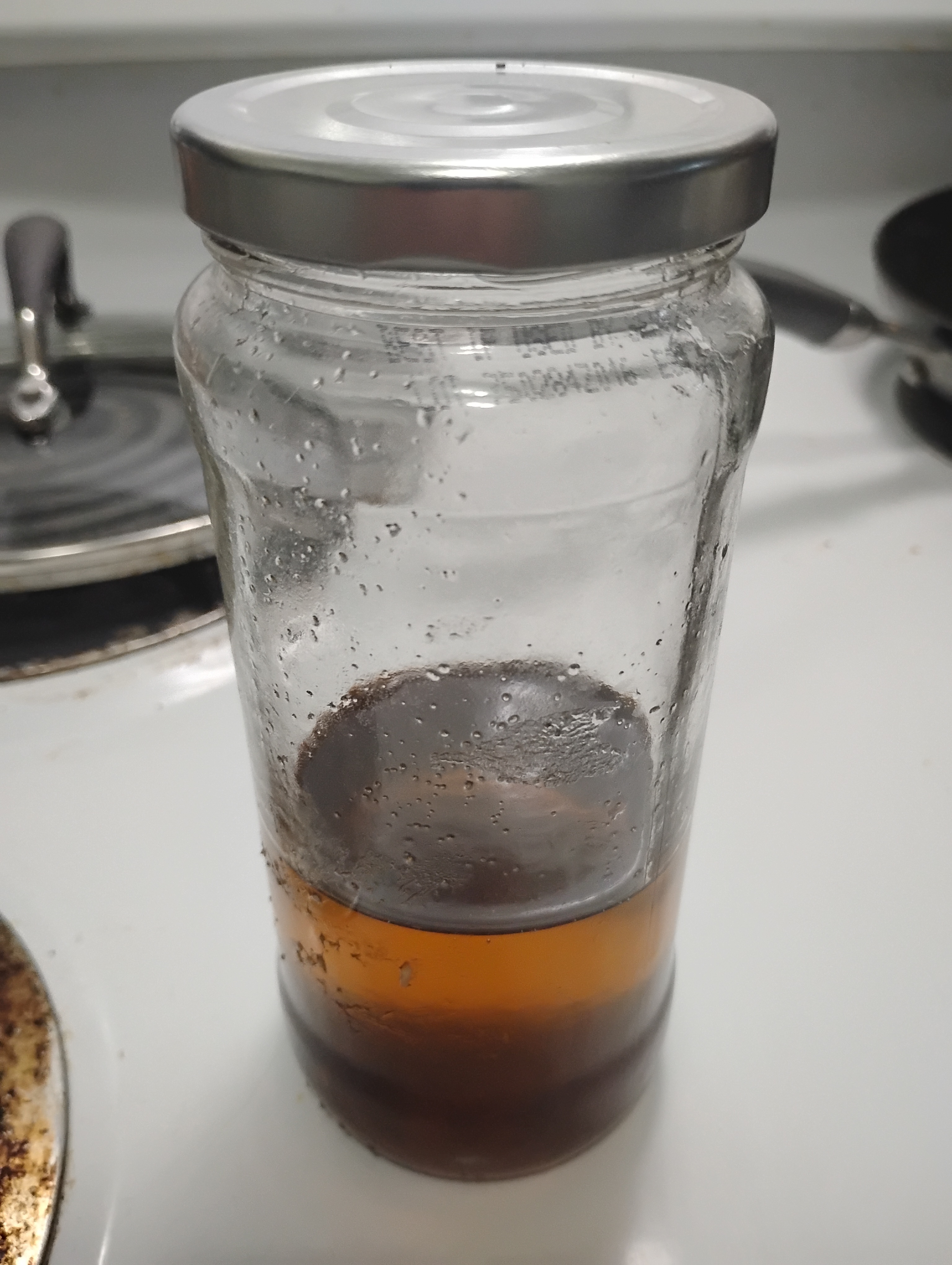We all know WD-40 works for making things move when they’re seized, but it also works better than anything for getting rid of all traces of adhesive left behind after peeling off stubborn stickers from things you buy.
It works on nearly all surfaces* – even coated paper! (just be sure not to leave it to soak into the paper.)
Instead of peeling slowly for ages with your fingernail or doing that peel-stick-peel-stick thing for half an hour, soak a paper towel in WD-40 and dab it on the offending sticker remains, wait a few minutes, then wipe off. (*if on coated paper, don’t let it soak, just gently rub it.) Clean the item afterwards to remove the oil left behind.
*it’s best to test a small area first if the object is painted or porous, and be careful with items meant to be food safe, because WD-40 is obviously not food safe.
This is something I wish more people knew, because soooo many manufacturers and retailers put stickers in the worst places and with near-permanent adhesive. I hope this helps you!
If you don’t have any, or want a food safe alternative, soak the remaining sticker in cooking oil.
Isopropyl alcohol also works.
Oh, I didn’t know about cooking oil, that’s awesome.
Alcohol works, but it will destroy many finishes (painted or stained furniture, coated paper, some coated metals, some plastics and rubbers, etc), whereas WD-40 is safe for most finishes.
Sounds like cooking oil may be as well – gonna have to try that, thanks!
Let is know once you test it, thanks
I’ve tested it on nearly everything over the years. It works on everything so far. I didn’t have any a bit ago and used alcohol instead, and it ruined the rubber surface. That’s why I posted this. I should have been less impatient and waited till I had some. Posted so others can learn before they ruin something like I just did.
The cooking oil?
I’m sorry, I answered your question from my inbox instead of in context in this thread, so I lost context.
I haven’t tried cooking oil, just WD-40. I’ll try cooking oil as you suggested.
I have some vegetable oil I fried chicken in to make chicken parmesan and since I was lazy the marinara came in a glass bottle that I peeled the label off to keep/reuse. The glue survived the dishwasher yesterday, so I’ll go lay that side in the used vegetable oil and report back in a few hours when I try to get it off.
#excitingfridaynights
Edit update: said glue/jar/oil

Will report back in a bit
Update next day: I forgot about it and left it overnight shitting in the vegetable oil in a frying pan. I went to clean it up this afternoon, and couldn’t find the glue. It dissolved into the oil, so water/soap to get the vegetable oil off… and it’s clean. (Won’t be reusing that oil)
Update: I forgot about it and left it overnight shitting in the vegetable oil in a frying pan. I went to clean it up this afternoon, and couldn’t find the glue. It dissolved into the oil, so water/soap to get the vegetable oil off… and it’s clean. (Won’t be reusing that oil)
forgot about it and left it overnight shitting
You are one hardcore dude…
… sorry, it got a chuckle out of me
deleted by creator
Cooking oil helps with scrubbing it off so that it doesn’t continue to stick. Good for scraping off the residue.
Hand sanitizer frequently works too.
Too much water. Not good with paper labels.
That’s got 70% isopropyl in it. Sometimes perfumes too.
You should know that wd is for water displacement. If you are trying to do anything else there is a better chemical you should use instead.
It’s much more than that, chemically. It’s a solvent, mostly, and contains (amongst other things) purified mineral spirits, temporary lubricants, etc. It’s got a whole lot of uses, and if you’re not going to spend time learning and stocking special-use chemicals (who actually does this but nerds, I sure don’t 😳), WD-40 is pretty versatile.
Versital perhaps but overrated since there are plenty of other chemical mixtures out there and a different one is usually better.
I’ve had good luck with Goo Gone.
It has an extremely strong citrus smell (which I don’t think is an additive for smell, as it’s overpowering).
kagis
No, according to them, orange extract is one of the solvents.
https://googone.com/media/ingredient/goo-gone-goo-and-adhesive-remover-spray-gel-ingredients.pdf
I came here to mention Goo Gone. Used it a lot.
Goo Gone is what I’ve used for years. It’s quite effective at the getting rid of the super stubborn ones.
WD-40 is a jack of all trades but master of none. There’s probably a better product, no matter what you’re trying to do, but everyone has a can of WD-40 lying around.
This is largely because people misuse WD-40. It’s a solvent. It was made to displace water, which is why it’s slick; It slips into wet joints, and sticks to everything it can so the water is repelled. But the chemical properties of this make it amazing at dissolving things that water won’t. It dissolves rust, which allows it to bust up seized joints. It dissolves oils, which makes it good for cleaning machine parts. It dissolves adhesives, which is why it’s so good at helping scrape them up.
It’s not a good lubricant, because that’s not what it’s made to do. After you dissolve all of the rust, you need to apply a fresh coat of oil, or else the part will just seize up again after the WD-40 evaporates. Because the WD-40 didn’t just dissolve the rust; It also dissolved the oil that was lubricating it and protecting it from further oxidation.
Oddly enough, some people swear by it as an arthritis treatment. Have some stubborn arthritis pain that painkillers or meds won’t touch? Try rubbing some WD-40 on the joint like lotion. Apparently it works when nothing else will.
The company’s stance is fully against using it on arthritic joints.
WD-40 Company does not recommend the use of WD-40 Multi-Use Product for medical purposes, and knows no reason why WD-40 Multi-Use Product would be effective for arthritis pain relief. WD-40 Multi-Use Product contains petroleum distillates and should be handled with the same precautions for any product containing this type of material.
People who swear by getting pain relief from spraying and/or rubbing on WD-40 are actually getting that relief from the cooling effect and/or rubbing, and it’s nothing to do with the chemicals in the spray.
I feel like you’re the only person here who actually understands what WD-40 is and what it’s for.
Thank you.
Thanks, this exactly. Each material has its own ideal product or method, but a light rub with WD-40 works on nearly anything (but not what you’re thinking – it’s never lube. It’s poisonous.).
It actually has interesting chemical properties.
You should also remember that it’s absolutely not a substitute for proper oil or grease lubrication. The WD stands for “Water Displacement.”
Came to say this. It works well for displacing things, not lubrication.
WD-40 and 3-in1 Oil, the olive oil and vinegar of the handyman world.
It’s actually a solvent, not a lubricant. It can unseize things, but you need to apply proper lubricant if you don’t want them to seize again.
Just use rubbing/cleaning alcohol, way cheaper too probably
Yeah, isopropyl alcohol is probably the best because it doesn’t leave any residue behind like oil, wd40, and other adhesive removers do.
I sometimes use both WD40 and alcohol, the former to losen the sticker, the latter to remove leftover residue
This is the way
YSK: it’s better to be cleaning with chemicals/liquids you won’t have to then clean up with other chemicals/liquids.
Stuff like Alcohol or Naptha which evaporate and don’t leave yet another residue to remove.
Same reason I don’t use goo-gone either.
normal vegetable oil has the same effect on sticker residue, like on jars and such.
Isopropyl alcohol is all you need, and is less aggressive than WD-40.
Alcohol is far more aggressive and will ruin many plastics, rubber, painted surfaces, finished wood, and coated paper.
Be really, really careful using alcohol on anything other than bare metal and some plastics. Many plastics and rubber will be made eternally sticky with alcohol (I made this mistake earlier today, which was why I posted this).
It is not a matter of more or less aggressive, some materials dissolve more easily in one type of solvent than in others. You can try, dissolving a teaspoon of salt in water is much easier than in oil. Have you ever eaten chocolate or drunk water while chewing bubblegum? Here the opposite happens, the fats in the chocolate dissolve the bubblegum rubber and make it softer while water doesn’t, it just chills it which makes it firmer.
Now plastic, rubber, or paints, finishings… can be many different things. IPA is safe to use on natural rubber while oils will make it swell and degrade, or even melt it. But most rubbers are synthetic, basically rubbery plastic. These plastics and other engineered materials can have all kind of different properties, while looking exactly the same. So the only thing you can do, other than research on that particular material and solvent, is trying it on a safer or hidden part of the thing.
In my experience: oil isn’t good on most rubbers, IPA is ok. For metals (iron, steel, mechanical parts…), contrary to you I usually advise to clean them with oil/grease, alcohol is appropriate if you don’t want it to be oily, only in rust resistant metals. Consumer/industrial products paints and finishings are usually fine with both ipa and oil if applied swiftly and dried quickly– acetone, kerosene, toluene… will strip them away probably. For wood, almost everything will fuck it up.
Recently I discovered I could use a hair dryer from the thrift store that has a diffuser. I have been gently softening the adhesive and peeling them off, and I have been finding that in most cases, it no longer leaves any adhesive behind!
It’s also great for taking crayon drawings off walls.
Have children to learn hacks ;)
More sticky children hacks, please. :)
Lighter fluid works great as well
True, but lighter fluid can ruin many surfaces. WD-40 is weirdly gentle on most surfaces (though it doesn’t seem like it would be).
I’ve never seen naptha (i.e. Zippo lighter fluid) do anything to any painted or finished surface, nor any of the plastics I’ve ever tired it on. I’ve been using the stuff in that context for decades, to the extent that I literally purchase it by the gallon. (I also use it in my lighters, because painter’s naptha is like 2% of the cost per volume of brand name Zippo fluid despite being the same stuff.)
WD-40 contains nonvolatile oils that will leave a difficult to clean off residue behind and if you use it on anything porous it will soak in and possibly stain the surface while being functionally impossible to remove without using yet more solvents. For that reason it’s not really a great way to get stickers off of things, especially things that you’d like to remain non-greasy or may need to stick something to again at some point in the future (paint, tape, etc.).
Naptha will evaporate entirely on its own given enough time, and you can even use it on paper and printed surfaces (excluding inkjet printed things, in my experience, which it will smear) with no harm done after it fully dries.
I’ve never seen naptha (i.e. Zippo lighter fluid) do anything to any painted or finished surface, nor any of the plastics I’ve ever tired it on.
I’d guess that it’s probably bad news for natural rubber. IIRC, naphtha is similar to gasoline, and gasoline will mess natural rubber up.
That being said, I have a can of naphtha myself.
kagis
https://en.wikipedia.org/wiki/Natural_rubber
The two main solvents for rubber are turpentine and naphtha (petroleum). Because rubber does not dissolve easily, the material is finely divided by shredding prior to its immersion.
Sounds like it.
One other thing to keep in mind is that it is (obviously, given that that’s how lighters that use it work) quite flammable in vapor form and the fumes aren’t great to breathe, so this is something you’d want to use in a well-ventillated area.
EDIT:
https://kleanstrip.com/solvents-and-thinners/vmp-naphtha/
Klean-Strip® VM&P Naphtha can be used in place of Paint Thinner for oil-based paint, varnish and enamel when a faster drying time is desired.
So I don’t think I’d want to casually get it on oil-based paint, since it’ll be a solvent for that too.
xylene or toluene or denatured spirits or acetone or basically any solvent you can buy at hardware store works for this really
check to make sure they don’t fuck up plastic though
They often fuck up plastic, rubber, fake leather, definitely paper, and painted or finished surfaces. WD-40 is usually safe on those surfaces (or as others have said, Zippo lighter fluid and possibly cooking oil).
Alcohol removes adhesive, but is likely to ruin the surface too.
If your car ever gets spray painted, WD-40 is also very good at removing that. Just spray it on a lint-free rag and gently wipe the spray paint and the WD-40 will dissolve the spray paint and whisk it away with a minimum amount of effort.
i use orange oil if i want it to smell nice, goo gone if i don’t care. both work great, the trick is saturating it with oil. mineral oil will work in a pinch too.













